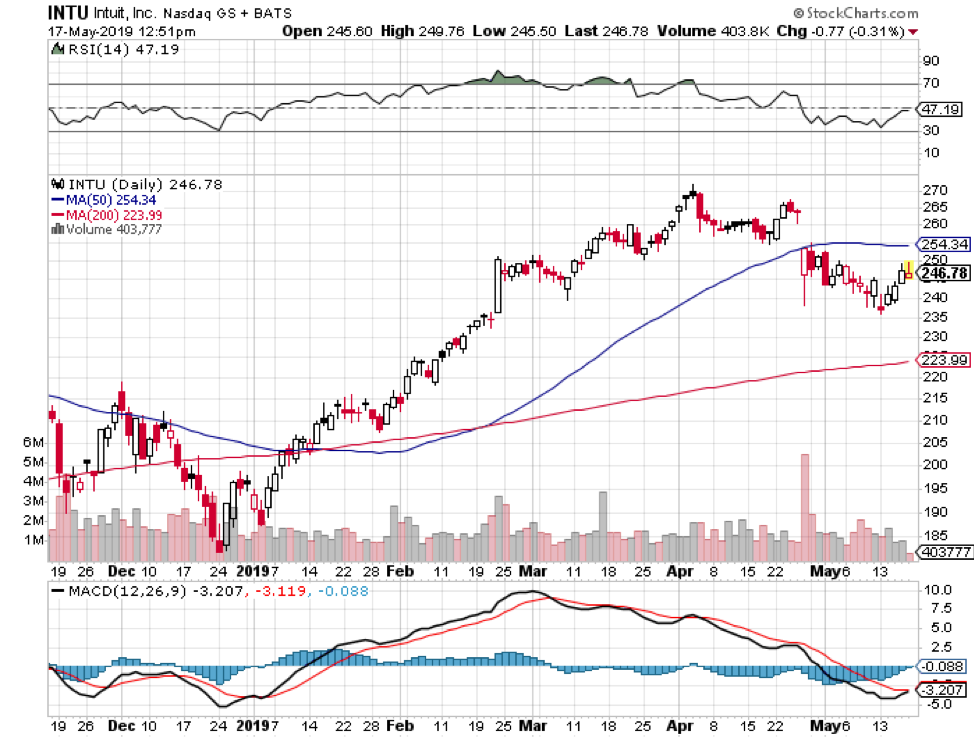Trade Alert - (INTU) May 17, 2019 - TAKE PROFITS-EXPIRATION
When John identifies a strategic exit point, he will send you an alert with specific trade information as to what security to sell, when to sell it, and at what price. Most often, it will be to TAKE PROFITS, but, on rare occasions, it will be to exercise a STOP LOSS at a predetermined price to adhere to strict risk management discipline.


Trade Alert - (INTU) – EXPIRATION
EXPIRATION of the Intuit (INTU) May 2019 $230-$235 in-the-money vertical BULL CALL spread at $5.00
Closing Trade
5-17-2019
expiration date: May 17, 2019
Portfolio weighting: 10%
Number of Contracts = 24 contracts
Assuming that the world doesn’t end in the next couple of hours, Mad Hedge Technology Letter subscribers will see their position in the Intuit (INTU) May 2019 $230-$235 in-the-money vertical BULL CALL spread expire at its maximum value of $5.00.
As a result, you have earned $1,920 or 19.04% in 15 trading days.
This was a bet that Intuit shares would not fall below the $235 strike price by the May 17 options expiration date. On the down 720 Dow day, Intuit came within a couple of cents of piercing the upper $235 strike price, then bounced hard.
Intuit is a company your family tax accountant loves and hates.
It is a financial software taking care of financial, accounting, and tax preparation for small businesses, accountants, and individuals.
The company is headquartered in Mountain View, California.
The bulk of its revenues derive from operations within the United States and that is music to my ears right now in this climate.
Intuit also owns TurboTax which is one of the most popular domestic income tax preparation software packages in the United States.
QuickBooks Online, another type of accounting software owned by Intuit, is the firm’s bread and butter product and expanded over 40% YOY.
Even with this premium growth, the small business unit was only able to grow 11% YOY.
QuickBooks Online now has 3.6 million subscribers demonstrating the large scope of its business.
Through feast or famine, people will always need accounting and financial software even with a fractious global trade war threatening to topple global trade.
This software stock will provide stable earnings and reliable profits because of its defensive nature.
However, its 3-year revenue growth of 12% is not what premium tech companies produce. Intuit needs to ramp up its revenue drive and I believe the changing of CEO from old hand Brad Smith to his hand-picked successor Sasan Goodarzi will do the trick.
Goodarzi has indicated that he intends to migrate up the value chain into the mid-tier business revenue stream hoping to land some notable deals.
His immediate job is to identify a solution to help accelerate the firm’s top-line growth again.
The addressable market is massive, and Intuit isn’t capitalizing on its position with smaller companies, leaving the opportunity to upsell more advanced software to customers on the table.
The alarm bells should be ringing.
Intuit requires an upgrade in its software strategy in an evolve-or-die tech climate.
Nurturing small business customers is part and parcel to adopting a legitimate growth strategy as the status quo moving forward.
Weeding out one’s core customer base is a kamikaze mission.
If Intuit nails this transition, then new income streams will open up while retaining old customers.
That being said, Intuit is still a good company and could become a great company if they want to.
They even have a dividend yield of 0.8%.
Intuit is an incredibly profitable company and has increased their 3-year EPS growth rate to 27%, presiding over high-profit margins of 33%.
Financial products which include financial software are incredibly sticky and I would lump accounting software into that group too.
Accountants do not fancy switching over accounting software every year and risk fudging the numbers.
The company has made around $1 billion in profits the past three years and annual revenue has steadily climbed from $4.19 billion in 2015 to $5.96 billion in 2018.
Management indicated that 2019 revenue will come in around $6.5 to $6.6 billion, a jump of around 8-10%.
In my books, 8-10% of a company of this ilk isn’t good enough.
I am hoping new management will roll out the Microsoft (MSFT) playbook which focused on its subscription as a service (SaaS) revenue stream and reaped the untold rewards.
Intuit needs to wean itself from selling packaged products.
And the 11% growth in last season's earnings report was a pitiful deceleration from 17% the year before.
It is clear that management has not pumped enough juice out of this baby and fresh blood should invigorate management at the top level.
Highlighting the attractive possibilities to grow the existing user base is the uptick in self-employed subscribers within QuickBooks online surging to around 745,000 from 425,000 YOY.
Cross-selling to this existing subscriber base would increase average revenue per user.
On a sour note, strength isn’t happening across the board with the desktop ecosystem revenues of $537 million sliding 4% YOY.
Intuit isn’t harnessing the tools they currently possess.
Converting the critical customer feedback into actionable results will boost the company’s products and would be a big first step in making this a premier software company along the lines of Adobe (ADBE).
They have the foundation set up to achieve an Adobe-like revenue trajectory.
A revamp to the sorely lacking functionality will drive more revenue and keep customers happy as well as pulling in more mid-tier income streams.
Here are the specific trades you need to execute this position:
EXPIRATION OF 24 May 2019 (INTU) $230 calls at.…$19.00
Sell short 24 May 2019 (INTU) $235 calls at……...….….$14.00
Net Cost:……………………..…….………..………….….............$5.00
Profit: $5.00 - $4.20 = $0.80
(24 X 100 X $0.80) = $1,920 or 19.04% in 15 trading days.
To see how to enter this trade in your online platform, please look at the order ticket below, which I pulled off of Interactive Brokers.
If you are uncertain on how to execute an options spread, please watch my training video on “How to Execute a Vertical Bull Call Spread” by clicking here.
The best execution can be had by placing your bid for the entire spread in the middle market and waiting for the market to come to you. The difference between the bid and the offer on these deep in-the-money spread trades can be enormous.
Don’t execute the legs individually or you will end up losing much of your profit. Spread pricing can be very volatile on expiration months farther out.
Keep in mind that these are ballpark prices at best. After the alerts go out, prices can be all over the map.



